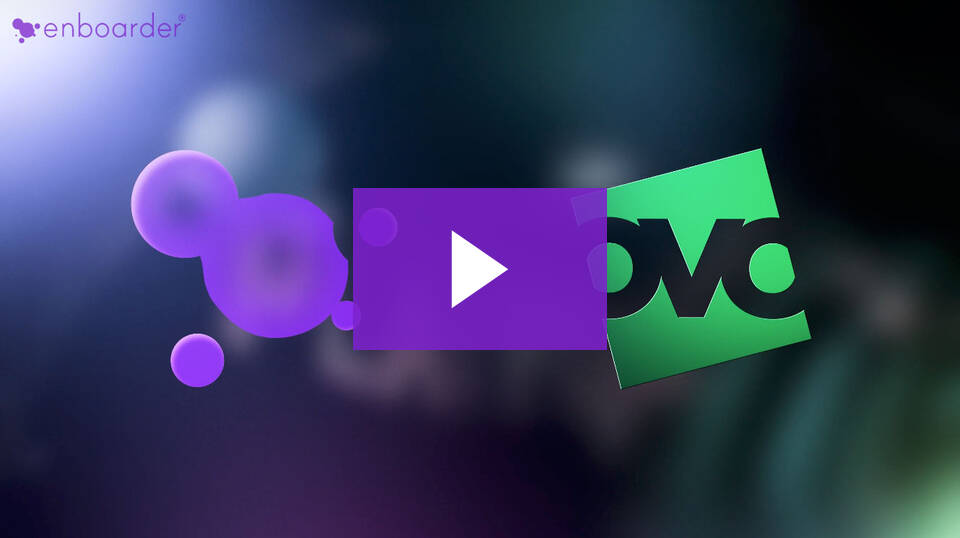How Games Strengthen Workplace Relationships
Ever played a game at a work meeting and thought to yourself, “Well, this is fun, but it can’t be a very productive use of time?” Play is fun. And that can feel like the opposite of work. But according to science, that couldn’t be far from the truth.
It turns out play is an essential part of how we humans stay alert, happy, and effective. And when play is incorporated into our work, it actually adds not only to our creativity but also to our ability to connect and work with one another in productive ways.
The transformative power of play is something many modern companies are re-discovering – as teams incorporate games and competitions into the flow of meetings and everyday business to stimulate curiosity, creative thinking, and cooperation.
At Enboarder®, we’ve found that play is an incredibly powerful tool to introduce people to each other at work and help spark important, lasting bonds among co-workers. In fact, we see connection networking games as a gateway to creating meaningful human connections in the workplace – and an ideal way to make in-person group events more meaningful and productive.
The science agrees.
The Science of Play
Since the dawn of our species, play has been an integral part of human life and development – as a tool for honing skills, solving problems, and forging bonds. Fast forward a few millennia, and adult play remains just as pivotal in shaping our cognitive and social abilities.
The research shows that play is not just for children. It’s essential for our ongoing happiness, creativity, and development, even as adults. As psychologist and play expert Dr. Stuart Brown observes, “Nothing lights up the brain like play. Three-dimensional play fires up the cerebellum, puts a lot of impulses into the frontal lobe – the executive portion – helps contextual memory be developed,” and so on.
Play Protects Against Depression and Increases Mental & Physical Health
Play, researchers have found, also actually works to stimulate emotional and physical well-being. As Dr. Brown has observed, “The opposite of play is not work; it’s depression.” Psychologists have proven that play can help to relieve stress, increase empathy, fuel vitality, improve brain function, and promote resilience. It can even help to heal trauma.
Play Enhances Cognitive Function and Creativity
Play, especially unstructured play, stimulates neural connections in the brain, enhancing creativity and problem-solving abilities. A study by the National Institute for Health found that play can stimulate dopamine (a neurotransmitter linked with creativity) production in the brain. Similarly, a 2019 study in the journal “Frontiers in Human Neuroscience” emphasized that playful behaviors can significantly enhance cognitive abilities and resilience in adults.
Play Fosters Collaboration, Innovation, and Team Building
Playful activities in a team setting can enhance group cohesion, improving collaborative efforts and mutual trust. A Chinese study in 2022 found when newer employees are provided with organizational social interaction out of the gate, their teams are more high-performing and innovative.
Play Increases Productivity
Engaging in playful activities can act as a stress reliever, rejuvenating the mind and potentially boosting productivity. Research has found that breaks filled with playful activities can restore attention and foster productivity in a work setting. And a 2020 study with telemarketing teams showed that employees who were given “play interventions” had decreased levels of stress and higher levels of team performance.
Play Encourages Continuous Learning and Resilience
Play helps cultivate a curious mindset, encouraging individuals to learn, adapt, and challenge their boundaries continually. In this book “Play: How It Shapes the Brain, Opens the Imagination, and Invigorates the Soul,” Dr. Stuart Brown discusses how play can keep the brain agile and contributes to acquiring new skills. Playful behaviors, especially those that mimic real-world challenges, prepare individuals for unpredictable situations, fostering adaptability – a critical skill in the ever-evolving professional world.
Play Strengthens Social Bonds and Improves Communication
Play serves as a medium through which individuals can connect, understand social cues, and improve their communication skills. Dr. Paul J. Zak, another pioneer in this field, has also shown that face-to-face social interactions, exercising the imagination, and telling stories together trigger the release of oxytocin, fondly known as the “bonding hormone.” This isn’t just about feeling good; it’s about building trust and fostering collaboration – crucial elements in a thriving workplace.
All of this means, when injected into the corporate bloodstream, play has the power to transform companies. Employees laugh more, trust flourishes, and even those dreary Monday mornings get more bearable!

Making More Time for Face-to-Face Play
We’re in the age of Zoom, Teams, and virtual everything. And yes, digital can be a remarkable facilitator for getting work done. But interestingly, when it comes to play, there’s no substitute for the magic of in-person interactions. That’s because a hormone called oxytocin gets released when you meet someone face-to-face. According to Dr. Zak, oxytocin fosters affinity and collaboration at higher rates in person. And 2022 research at Cornell has shown that face-to-face learning enhances innovation and education. So it’s important to get employees in the same room occasionally, when you’re hoping to forge better connections and collaboration.
Sherry Turkle, renowned author and researcher, has also pinpointed the uniqueness of in-person chats. There is an irreplaceable value in face-to-face conversation, she says. It fosters empathy, enhances understanding, and deepens relationships – crucial for any team’s success. Companies who emphasize in-person interactions, whether through regular meet-ups or team-building exercises, witness an uptick in teamwork and productivity, according to Turkle. When we are face-to-face, we’re in sync, she says – and attuned not just to words, but to unspoken emotions. This symphony of understanding amplifies teamwork, making it genuine and seamless.
Play and Friendship
Of course, part of the story of play is about who we play with. The correlation between having a best friend at work and optimal business performance has been substantiated by years of Gallup data. Managers, they argue, should be fostering opportunities for these friendships to take root and flourish.
Feeling valued and appreciated in an organization is directly linked to the social support derived from workplace friendships. As research by Dr. Sean Horan has shown, active participation in social networks that offer a sense of substantial support is also a great way to ensure employees stay on board and don’t churn out of your organization.
Let the Games Begin: Gamification and Play at Work
So, how do we harness the power of play and face-to-face interactions in a structured, measurable way in the workplace? Enter gamification.
To be clear, gamification isn’t just throwing out badges, points, or leaderboards. It’s about integrating game mechanics into non-game contexts (like networking) to foster engagement, motivation, and a sense of accomplishment. With networking games, the goal is clear: to help employees get to know one another on a personal, more profound level.
When employees engage in well-designed networking games, a magical transformation happens. Barriers fall. Laughter ensues. Stories are shared. People begin to see colleagues beyond their job titles. It’s a bit like adult recess, but with a twist. Networking games might involve trivia about colleagues, team challenges, or narrative storytelling.
Case in Point: Enboarder’s Networking Game
At Enboarder, we have developed this idea into a set of activities we call the Networking Game.
At these live events, co-workers come together and share fun facts about themselves. By sharing personalized Connection Cards and fun facts, people can get to know new faces – and discover new talents, skills, and friendships across the organization. Co-workers scan QR codes on the back of the cards – one for each contact made – and engage in a friendly competition to see who can make the most connections.
This live, “meet-and-greet” encourages employees to step out of their comfort zones, break silos, and bond with colleagues across different departments. It is perfect for existing events such as holiday parties or sales kick-offs – but it is also an incredible excuse to just bring people together and spark connections within your organization that will last for years to come.
This kind of voluntary in-person communication and sharing is essential to creating a collaborative workplace. In fact, MIT’s Human Dynamics Laboratory has identified communication as the most critical predictor of team success, outweighing individual intelligence, skill sets, and even the substance of discussions. Likewise, exchanging information and personal viewpoints has been found to be more impactful than conventional team-building activities, according to a 2022 study by Vyond. When that communication is enhanced within an environment of play and “co-opetition,” it is made all the more powerful.
The biggest win? When structured play enters the corporate scene, engagement soars. Those wary of small talk find themselves sharing, laughing, and connecting. It’s like a turbocharger for company culture and values. Reach out to us if you’d like to learn more about the Networking Game – we are offering it as a plug-and-play corporate event and would be happy to tell you more, even if you’re not currently a customer of ours.
P.S. We tested the game out for ourselves at our recent company off-site. Check out the fun video here.
Five Tips for a Playful Workplace
Considering introducing networking games and play into your work culture? Here are some additional tips and guidelines:
- Tailor the Fun to Your Culture: Every company has its rhythm. Choose games that groove with your culture and mission.
- Be Sure Everyone’s on Board: Ensure your games resonate with everyone. No one should feel like the kid left out in the schoolyard. Also, understand different styles of communication, and leave room for people to engage at their own pace. Everyone should be comfortable and willing to participate.
- Consider co-opetition: Not everyone likes a cut-throat contest. If you’re introducing competitive play into your workplace, consider low-stakes games or opportunities for cooperation and friendly competition, rather than a zero-sum game that creates winners and losers.
- Continuously Evolve: When organizing play at work, feedback is your friend. What works today might need tweaks tomorrow. Ask employees what they think – and remember that the objective isn’t the game itself, but to nurture human connection.
- Game responsibly: Remember to respect work and set aside very specific times and places for your networking games – such as an on- or off-site meeting dedicated to connecting through play.
Harnessing the Power of Play
Networking games aren’t about wasting time; they’re about investing in human connections. In the corporate marathon, they’re the delightful water stations, offering a momentary break, a sip of fun, and a burst of energy. So, next time someone suggests a game at work, jump in! After all, the workplace that plays together, slays together.
In an ever-evolving corporate landscape, where remote work and digital communication tools are omnipresent, the essence of personal human connection becomes even more valuable. Networking games aren’t frivolous activities; they’re strategic tools to cultivate a workplace that thrives on trust, understanding, and collaborative spirit.
In the words of Plato, “You can discover more about a person in an hour of play than in a year of conversation.” Maybe it’s time companies listened.
Ready to learn more? Check out how OVO Energy used the Connection Networking Game below … ⬇️

OVO Energy Connection Networking Game